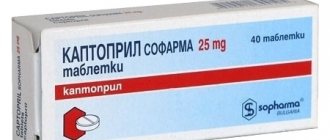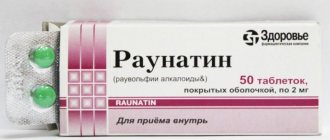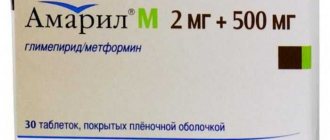Atarax is a tranquilizer with anxiolytic, antiemetic and sedative effects. Instructions for use will show how to properly take 25 mg tablets, injections in injection ampoules for the treatment of irritability and skin itching. What Atarax helps with, information on prices, analogues and patient reviews will also be presented in the article.
Release form and composition
The medication is available in the form of tablets and solution for intramuscular administration.
- Atarax tablets, white coated, scored. 1 tablet contains hydroxyzine hydrochloride 25 mg. Excipients: colloidal silicon dioxide, lactose monohydrate, magnesium stearate, microcrystalline cellulose. Shell composition: opadry white Y-1-7000 (titanium dioxide, macrogol, hypromellose). Cardboard pack, 1 blister, 25 tablets.
- Atarax solution for intramuscular administration is colorless, transparent. In 1 ampoule of hydroxyzine hydrochloride 50 mg, 100 mg. Excipients: water, sodium hydroxide. Cardboard packs, plastic pallets (1), ampoules (6).
Clinical and pharmacological group: tranquilizer (anxiolytic).
Pharmacological characteristics
Taking Atarax helps provide sedative, antiemetic, antihistamine (eliminates itching and urticaria), analgesic effects, relaxes skeletal and smooth muscles, improves memory and attention.
The use of the drug lengthens the duration of sleep, reduces the frequency of night awakenings after a single dose of 50 mg tablet.
The use of tablets does not cause addiction or dependence; the pharmacological effect occurs 15 minutes to half an hour after taking the drug. Long-term use of the tablets did not result in the development of withdrawal syndrome or deterioration of cognitive functions of the brain.
Atarax price
You can buy the drug Atarax through pharmacies or the Internet at a cost that is affected by the type of medicine and the level of trade markup. Approximate prices for a pack of tablets 25 pcs. in pharmacies in Moscow and St. Petersburg will be:
| Pharmacy name | Price per pack of tablets, in rubles |
| Pills.ru | |
| Zdravzona | |
| Help window | |
| PremierPharm |
Why is Atarax prescribed?
Atarax is prescribed for the treatment of adult patients in the following cases:
- In order to eliminate manifestations of anxiety, internal tension, psychomotor agitation, high irritability in the treatment of patients with neurological, somatic, and mental diseases.
- For chronic alcoholism, as well as to eliminate withdrawal syndrome, which is accompanied by psychomotor agitation.
- As a somatic remedy during premedication.
- As a symptomatic remedy to eliminate skin itching.
Indications for the use of Atarax are determined by the attending physician. As a rule, indications for the use of the drug are for a variety of skin diseases that are accompanied by severe skin itching.
Contraindications
As stated in the official instructions for Atarax, this drug is prescribed in tablet form:
- To relieve psychomotor agitation, increased irritability, feelings of internal tension, anxiety in neurological, somatic and mental (including against the background of adaptation disorders and generalized anxiety) diseases and chronic alcoholism;
- To eliminate psychomotor agitation caused by withdrawal syndrome in chronic alcoholism;
- To eliminate skin itching (for symptomatic treatment), including in children;
- As a sedative during premedication, including for children.
In the form of Atarax solution, according to the instructions, it is used:
- For the treatment of neuroses and neurotic conditions manifested by anxiety, feelings of emotional stress, increased excitability;
- For the treatment of organic lesions of the central nervous system, accompanied by increased excitability;
- To eliminate withdrawal symptoms caused by chronic alcoholism;
- As a sedative during preparation for surgery;
- To relieve and prevent vomiting in the postoperative period;
- As a symptomatic remedy to eliminate skin itching.
According to the annotation for the drug, the use of Atarax is contraindicated in:
- Porphyria;
- Hereditary galactose intolerance;
- Pregnancy and lactation;
- Impaired absorption of glucose and galactose;
- Angle-closure glaucoma;
- The presence of hypersensitivity to hydroxyzine, any auxiliary component of the drug, as well as cetirizine, aminophylline, ethylenediamine, piperazine derivatives.
The medication is prescribed, but with extreme caution and under constant medical supervision when:
- Myasthenia;
- Difficulty urinating;
- Prostatic hyperplasia;
- Predisposition to the development of arrhythmia;
- Increased intraocular pressure;
- Tendency to seizures;
- Dementia.
Atarax dose reduction is required:
- Elderly people (especially if their glomerular filtration rate decreases);
- Patients with moderate and severe renal failure;
- For liver failure.
Atarax tablets are prescribed to adults for mental disorders of the emotional sphere, post-traumatic syndrome, increased anxiety, to relieve internal tension in somatic, neurological and mental pathologies.
Atarax is included in the course of complex treatment of prolonged alcoholism with increased aggressiveness, as well as for dermato-venereological diseases, which are characterized by severe itching of the skin. In small doses, Atarax is prescribed to relieve moderate itching in allergies and skin lesions of mild to moderate severity. The use of Atarax for children is indicated for allergic pathologies of the skin.
Atarax should not be used if you have porphyria - a congenital pathology of hemoglobin, which is characterized by its instability and increased breakdown of blood cells, as well as any signs of intolerance to hydroxyzine or the auxiliary components of Atarax tablets. Atarax should not be prescribed to pregnant women, since a strong anti-anxiety drug can negatively affect the condition of the fetus, and during childbirth, eliminate uterine contractions, which is a threat to the life of the mother and the unborn child. During lactation, the use of Atarax is also contraindicated.
Great care should be taken when using Atarax in patients with muscle weakness, problems with the nervous system, a history of seizures and heart rhythm disturbances, people with increased intraocular pressure, prostate hyperplasia, as well as those with impaired gastrointestinal motility.
- Porphyria;
- Pregnancy and lactation;
- Impaired absorption of glucose and galactose;
- Angle-closure glaucoma;
- Hereditary galactose intolerance;
- The presence of hypersensitivity to hydroxyzine, any auxiliary component of the drug, as well as to cetirizine,
- aminophylline, ethylenediamine, piperazine derivatives.
There are not many contraindications to taking Atarax, the main ones are:
- Age under 18 years - since this drug has not been studied in children and adolescents, therefore it is impossible to predict side effects from its use;
- Pregnancy and lactation - during pregnancy, it is recommended to replace this drug with a similar one that is safer for the fetus; lactation must be stopped before taking Atarax, since it can enter the child’s body through breast milk.
Also, taking this drug is contraindicated for people who have an individual intolerance to one of the components of this drug.
Additionally, it should be noted that while taking this drug, it is prohibited to drink alcoholic beverages. Atarax enhances the effect of ethanol on the nervous system and can cause serious disorders of the nervous system.
indicated for the symptomatic treatment of anxiety conditions observed in adult patients, as well as a sedative for preoperative premedication. Atarax can be used for the symptomatic treatment of itching.
Application
Contraindicated in case of hypersensitivity to any substance included in the drug, as well as to cetirizine and drugs containing piperazine, aminophylline, ethylenediamine or their derivatives. Prescribing and taking the drug is contraindicated if the patient has porphyria. The lactose content of Atarax precludes its use in patients with hereditary galactose intolerance, Lapp lactase deficiency or glucose-galactose malabsorption.
The drug Atarax has a fairly wide range of indications. It can be used by adults and children who suffer from neuropsychiatric disorders.
for adults
Among the main indications for prescribing the drug are:
- increased anxiety;
- psychoneurotic conditions;
- eczema, dermatoses;
- pruritus;
- mental disorders;
- behavioral disorders
- neurasthenia.
Indications for prescribing the drug may also be other conditions that interfere with a person’s general well-being and behavior.
for children
For children, the drug is prescribed with a number of exceptions for congenital or acquired pathologies. The main indications include nonspecific symptoms characteristic of infants, as well as strong skin reactions of the body, developmental disorders, decreased memory, and concentration. In pediatrics, the drug is used only in extreme cases, can only be used in a hospital setting and only in the form of a solution for injections. Tablets are not prescribed for children under 12 years of age.
The drug is contraindicated during pregnancy. Taking it can cause fetal death, disturbances in its development, miscarriage and other serious conditions.
The drug Atarax is not prescribed if a person has a history of the following conditions or diseases:
- pregnancy;
- breastfeeding;
- porphyria;
- allergy to the composition;
Patients with pathologies of the kidneys, liver, heart, diabetes mellitus, as well as hereditary glucose intolerance take the medicine with caution. Atarax is intended only for patients with a history of mental and nervous disorders. The medicine cannot be used for prophylactic purposes or without first consulting a doctor.
Medical instructions for use
Atarax is taken orally or administered by intramuscular injection.
For the symptomatic treatment of itching in children:
- at the age of 1 to 6 years, the drug is prescribed in a daily dose of 1-2.5 mg/kg body weight in several doses;
- over the age of 6 years - at a dose of 1-2 mg/kg/day in several doses.
For premedication in children, the drug is prescribed at a dose of 1 mg/kg body weight 1 hour before surgery, and additionally in the evening before surgery.
- For the symptomatic treatment of anxiety, adults are prescribed a dose of 25-100 mg/day in several doses during the day or at night. The average dose is 50 mg/day (12.5 mg in the morning, 12.5 mg in the afternoon and 25 mg at night).
- If necessary, the dose can be increased to 300 mg/day.
- For premedication in surgical practice, it is administered intramuscularly at a dose of 50-200 mg (1.5-2.5 mg/kg) 1 hour before surgery, and additionally in the evening before surgery.
- For the symptomatic treatment of itching, the initial dose is 25 mg; if necessary, the dose can be increased 4 times (25 mg 4 times a day). The maximum single dose should not exceed 200 mg, the maximum daily dose is no more than 300 mg.
In elderly patients, treatment begins with half the dose. In case of renal and/or liver failure, doses should be reduced.
The usual duration of treatment is four weeks, but depending on the patient's condition and diagnosis, the doctor may change these values.
How to take Atarax
Price Atarax 25 mg (25 mg) – 298 rub.
Atarax should be used according to the instructions for use or in strict accordance with medical prescription. How long to take Atarax and in what dosage depends on the diagnosis and condition of the patient.
Pills
Children
- Elimination of itching: the dosage for children 1-6 years old is determined in the amount of 1-2.5 mg per 1 kg of body weight, divided into several doses. For children over 6 years of age, the daily dosage is 1-2 mg per 1 kg of body weight, distributed over several doses.
- Medication preparation for surgical or diagnostic operations: drugs are given the night before the planned event and 60 minutes before the procedure. Dosage – 1 mg/kg.
Adults
- Anxiety therapy: daily dosage – from 25 to 100 mg throughout the day or before bedtime. It is recommended to divide the total amount into three parts in a ratio of 1:1:2. Smaller portions should be taken in the morning and at lunch, and the last portion should be taken before bed. The permissible daily maximum is 300 mg, one-time – 200 mg.
- For elderly patients, the dosage is prescribed in an amount of ½ of the usual adult dose.
- Patients with moderate to severe renal dysfunction and liver failure are prescribed a reduced dosage.
Injections
The drug is administered intramuscularly.
Children
The daily dosage is determined depending on body weight. The calculated amount is distributed into several doses.
Elimination of itching:
- 1-6 years: 1-2.5 mg/kg
- From 6 years: 1-2 mg/kg
Premedication: 1 hour before surgery, 1 mg/kg is administered intramuscularly. If there is a need, then the same dosage is administered the evening before the operation.
Adults
The highest dosage of Atarax for a single administration is 200 mg, daily dosage is 300 mg.
- Symptomatic treatment of anxiety: 50 mg/day in three doses (in the morning and afternoon - ¼ of the drug, in the evening - 2/4 of the daily amount). In difficult cases, it is allowed to inject no more than 300 mg.
- Relieving itching: first – 25 mg, if necessary, the total amount can be increased. It is allowed to administer 25 mg x 4 times per day.
- Medical preparation for surgery: 1 hour before the intervention - 50-200 mg, and if necessary, the same dose can be administered the evening before anesthesia.
- Elderly patients are recommended to use half the adult dose.
- Patients with liver and/or kidney dysfunction also receive a reduced dosage.
Use during pregnancy and breastfeeding
Laboratory studies conducted on experimental animals have shown that hydroxyzine has a toxic effect on the development of offspring. The substance passes through the placenta, its content in the fetal body significantly exceeds the concentration in the maternal body. At the moment there is no information whether the substance has a similar effect on the human body. Therefore, it is forbidden to use Atarax during pregnancy, during childbirth and after it.
Women of childbearing age are recommended to use reliable contraceptives during therapy.
It is also prohibited to use the drug during lactation, since the main metabolite of hydroxyzine passes into milk. It is known that severe side effects were observed in infants whose mothers used the drug in late pregnancy, shortly before birth or several hours later. Based on the results of clinical observations, it follows that Atarax is dangerous for children due to the provocation of extrapyramidal disorders, central nervous system depression, urinary retention, and neonatal hypoxic complications. Therefore, nursing women should use other medications or give up lactation.
Side effects
The consequences of using Atarax are associated with its ability to affect the central nervous system, exhibit anticholinergic activity or provoke individual reactions of the body.
- Immune system: hypersensitivity reactions, anaphylaxis
- Central nervous system: general weakness (most often at the beginning of the course), agitation, confusion, disorientation, hallucinations, drowsiness/insomnia, headaches, sedation, dizziness, tremors of the limbs, convulsions, dyskinesia.
- Visual organs: accommodation disorder, decreased visual acuity
- CVS: tachycardia, QT interval prolongation, ventricular tachycardia (pirouette type), hypotension
- Respiratory system: bronchospasm
- Digestive organs: dry mouth, nausea, vomiting, constipation, changes in liver function tests
- Skin and subcutaneous tissue: rashes similar to erythema, urticaria, dermatitis, Stevens-Johnson syndrome, dermatitis, erythema multiforme, Quincke's edema, increased sweating
- Genitourinary system: urinary retention
- Other: fatigue, general weakness, fever.
- The consequences of taking a large amount of Atarax provokes an overdose, which manifests itself in the form of enhanced side effects, primarily a strong anticholinergic effect, central nervous system suppression and the development of paradoxical conditions. In addition, intoxication manifests itself in the form of:
- Nausea, vomiting.
- Drowsiness.
- Uncontrolled motor activity.
- Hallucinations.
- Cloudiness of consciousness.
- Heart rhythm disturbances, arrhythmia.
- Decreased blood pressure, hypotension.
- Disorders of the pupillary reflex.
- Increase in temperature.
Read also: Why is Pirantel prescribed?
Instructions, reviews and analogues, price in pharmacies In severe cases: tremor, disorientation, convulsions, coma, cardiorespiratory collapse.
There is no special antidote to Atarax, and hemodialysis is usually not used due to its low effectiveness.
To eliminate the consequences of an overdose, you must first cleanse the body of drug residues. To do this, vomiting is forcibly stimulated and the stomach is washed. Simultaneously with the measures taken, it is important to constantly monitor respiratory and cardiac activity, constantly monitor ECG indicators, and maintain the functions of vital organs.
The patient should be under the supervision of a doctor until the symptoms disappear and for the next 24 hours.
Overdose of Atarax
Symptoms of an Atarax overdose are vomiting, nausea, hallucinations, involuntary motor activity , arrhythmia, disturbances of consciousness, and arterial hypotension.
Treatment, in the absence of vomiting, should begin with gastric lavage and inducing it artificially. After which it is necessary to monitor the condition of vital organs for 24 hours. It is possible to prescribe Metaraminol or Norepinephrine.
A decrease in side effects occurs as the dose is reduced, or they disappear on their own some time after the start of treatment.
Analogs
- Hydroxyzine.
- Adaptol.
- Afobazol.
- Gidazepam.
- Phenazepam.
- Relanium.
- Grandaxin.
- Diazepam.
- Diazepex.
- Zolomax.
- Stremaza.
- Vinpotropil.
- Teraligen.
- Phenibut.
When choosing analogues, you must remember that the instructions for use of Atarax, price and reviews do not apply to drugs of similar effect. Replacing the drug is permissible only after the recommendation of a doctor.
Which is better: Phenibut or Atarax?
Phenibut is a drug that has antihypoxic and nootropic effects. This drug effectively relieves anxiety, tension, and normalizes sleep. The cost of a package of Phenibut (20 pcs.) is about 170 rubles.
However, this drug is not a complete analogue, since the active ingredient of Phenibut is aminophenylbutyric acid. Therefore, only a doctor can decide to replace one drug with another.
Reviews from doctors about use for VSD
Complications of vegetative-vascular dystonia (VSD) such as panic attacks, unfortunately, are not uncommon among people suffering from this disease.
Many neurologists and psychiatrists prescribe Atarax and achieve positive results in the treatment of patients. Thus, a psychotherapist from the city of Saratov, who has been practicing for 17 years, considers this drug very effective, prescribes it for autonomic disorders in addition to the main therapy, to alleviate the patient’s condition, before the effect of other drugs occurs. According to him, the medicine does not cause addiction and, even in old age, did not provoke complications in patients, such as psychotic states.
The only negative point is its short-lived effect, since it eliminates the symptoms without eliminating the cause of the condition.
A psychotherapist in Moscow who has been practicing for more than 12 years, uses this medicine as a tranquilizer, effective for mild depressive states and disorders such as tachycardia, increased sweating and salivation, a feeling of a lump in the throat, headaches.
Used in combination with other drugs to relieve symptoms, even such as skin manifestations. Notes that the medicine does not affect the sexual sphere of both sexes.
A psychiatrist from Omsk, who has 24 years of experience in this field, speaks no less positively about Atarax for VSD. He notes that this drug is well tolerated by everyone and the results quickly occur. The medicine is not addictive. It is used mainly as a course of treatment at the time of exacerbation of the condition in neurotic disorders associated with a violation of the VSD. The effect is achieved quickly. It does not cause addiction if you follow the recommendations of a specialist. Can be taken during an attack or while waiting for it. No drowsiness. Insomnia at night stops.
special instructions
If the patient needs to undergo allergy tests, treatment with the drug is stopped five days before the test.
- Patients who drive should note that the drug may affect reaction speed and concentration.
- If the patient has a history of seizures, then treatment with the drug should be administered very carefully.
- Considering the fact that Atarax has an anticholinergic effect, it should be used carefully to treat patients with glaucoma, constipation, myasthenia, and dementia. You should avoid taking sedatives while taking this drug.
- The drug is prescribed with caution to patients with cardiac arrhythmia and those who use antiarrhythmic drugs. When treating older people, half the dose of the drug is initially prescribed.
Compound
The active substance is hydroxyzine dihydrochloride. A special feature of this drug is its dissimilarity with central nervous system depressants, which minimizes the negative impact on the subcortical areas.
The effect after use lasts up to 4 days depending on the degree of the disease. The product also has a pronounced antispasmodic and sympatholytic effect. Patients taking it note an increase in sleep duration, lack of anxiety and insomnia. Along with this, a certain passivity and a decrease in muscle tone appears.
Doctors note that the highest degree of concentration in the blood is observed 1.5-2 hours after consumption. As for removing the substance from the body, in children this process occurs much faster: up to 22 hours, while in adult patients this figure is already 28 hours.
Drug interactions
The simultaneous use of Atarax with cardiac glycosides, atropine, antihypertensive drugs, antihistamines does not reduce the pharmacological effect of these groups of drugs.
Atarax cannot be used in conjunction with drugs from the group of anticholinergics and MAO inhibitors.
With alcohol
Alcohol and Atarax cannot be combined, since drinking alcohol increases the effect of the drug. The use of Atarax with alcohol causes significant depression of central nervous system functions. This combination can increase the state of intoxication, lower blood pressure, and cause allergic reactions.
Overdose
The drug can be prescribed to the patient both for intramuscular use and for use in tablets. If the standard dose is exceeded, a loss of strength and a slowdown in reactions occurs due to inhibition of the nervous system.
Call an ambulance immediately if a patient who has taken the medication experiences the following symptoms:
- Severe nausea (vomiting);
- Tachycardia;
- Increased sweating;
- Body cramps;
- Loss of consciousness;
- Hallucinations.
As first premedical aid, it is necessary to immediately rinse the patient’s stomach, artificially inducing vomiting to remove the toxic substance from the body. After examination by a doctor and elimination of symptoms of poisoning, it is necessary to monitor patients throughout the day. If the patient's condition worsens, it is necessary to take norepinephrine or metaramenol.
What do the reviews say?
Reviews from doctors about Atarax are positive. Patients note that the tablets effectively reduce anxiety, help normalize sleep, and relieve panic attacks. However, sometimes the medicine causes constant drowsiness, lethargy, and decreased ability to work.
Reviews of use by children indicate that with the correct dosage and taken under the supervision of a physician, the product helps eliminate allergic reactions that cause severe skin itching.
1 665
Side effects
In general, Atarax is well tolerated by all groups of patients. But, in rare cases, it can cause negative side effects such as:
- drowsiness, headache, general weakness of the body, dizziness. If these effects persist, it is necessary to reduce the dosage of Atarax, but not stop treatment;
- arterial hypotension, tachycardia;
- changes in liver function, nausea;
- increased sweating, fever, bronchospasm, allergic skin reactions.
With large dosages of Atarax in old age, accommodation disorders, a feeling of dryness in the mouth, urinary retention, and constipation may develop.











